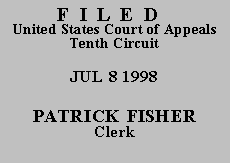

| DAVID L. LARSON,
Petitioner-Appellant, v. HANK GALETKA, Warden, Utah State Prison, Respondent-Appellee. |
|
Petitioner David L. Larson challenges the constitutionality of the state statute under which he was denied probation for his convictions for sodomy on a child and sexual abuse of a child. In his petition for habeas corpus relief under 28 U.S.C. § 2254, he claims that Utah Code Ann. § 76-5-406.5(1) is unconstitutionally vague and violates his rights to due process, to equal protection of the laws, and to be free from cruel and unusual punishment. The district court denied habeas relief. We exercise jurisdiction under 28 U.S.C. § 1291,(1) and affirm.
On July 28, 1986, petitioner pled guilty to one count of sodomy on his five-year-old stepdaughter in violation of Utah Code Ann. § 76-5-403.1(1) and one count of sexual abuse of his four-year-old stepdaughter in violation of Utah Code Ann. § 76-5-404.1(1). He had been married to the girls' mother for about five months. He committed the offenses sequentially and in the presence of both girls on a day when their mother was away from the home. The trial court sentenced him to concurrent terms of a mandatory minimum five years' imprisonment to life, and one to fifteen years' imprisonment. The trial court did not sentence petitioner to probation because § 76-5-406.5(1) and subsections (1)(d) and (1)(f) did not provide probation as an alternative for a defendant who had lived with his stepchildren for less than a year, or who had committed an offense against more than one victim at the same time or during the same course of conduct, or who had knowingly committed the offense in front of a person other than the victim. See State v. Larson, 758 P.2d 901, 902-03 (Utah 1988) (discussing facts of case and quoting then-current version of § 76-5-406.5(1)). Petitioner believes he should have been sentenced to probation.
Petitioner's claims are without merit. The five-year minimum mandatory sentence for sodomy on a child does not constitute cruel and unusual punishment. See State v. Bishop, 717 P.2d 261, 268-72 (Utah 1986). Nor does § 76-5-406.5(1) violate the equal protection clause. See id. at 265-67; State v. Egbert, 748 P.2d 558, 559 (Utah 1987). Finally, § 76-5-406.5(1) is not unconstitutionally vague. See Egbert, 748 P.2d at 559-60.
Petitioner is granted a certificate of probable cause. The judgment of the United States District Court for the District of Utah is AFFIRMED.
Entered for the Court
Circuit Judge
*. This order and judgment is not binding precedent, except under the doctrines of law of the case, res judicata, and collateral estoppel. The court generally disfavors the citation of orders and judgments; nevertheless, an order and judgment may be cited under the terms and conditions of 10th Cir. R. 36.3.
1. Because petitioner filed his petition before the enactment of the Antiterrorism and Effective Death Penalty Act, the Act's certificate of appealability provisions do not apply. See United States v. Kunzman, 125 F.3d 1363, 1364 n.2 (10th Cir. 1997), cert. denied, 118 S. Ct. 1375 (1998). We grant petitioner a certificate of probable cause.